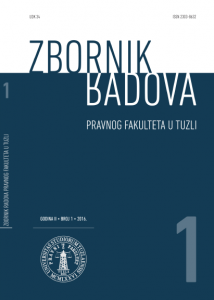Opsada Sarajeva i pravna odgovornost Vijeća sigurnosti Prema povelji UN
The siege of Sarajevo and the legal responsibility of the Security Council under the UN Charter
Author(s): Vladimir-Đuro DeganSubject(s): Law, Constitution, Jurisprudence, International Law, Human Rights and Humanitarian Law, Military history, Political history, Transformation Period (1990 - 2010), Post-Communist Transformation
Published by: Pravni fakultet Univerziteta u Tuzli
Keywords: UN Security Council; Arms embargo; Enforcement actions under Chapter VII of the Charter, observer missions and peace-keeping operations; UNPROFOR; Genocide;
Summary/Abstract: Responsibility in law and in international law in particular, can occur by conduct consisting of an action, but also of omission by an organ in situation in which its action is necessary for preventing an internationally wrongful act. The responsibility of the UN Security Council for the maintenance of peace and security in Bosnia-Herzegovina and Croatia between 1991 and 1995 primarily results from its omission to undertake efficient measures in order to avert aggression and large-scale international crimes. This paper presents numerous Security Council resolutions dealing with the war in Croatia and Bosnia-Herzegovina, and especially with the siege of Sarajevo. From originally an observer mission, it was later on entrusted with the peace-keeping, but never with a clear mandate sufficient for performing its rapidly expanded duties. It was never authorized to use force beyond that required in self-defense, and in order to secure the transportation of humanitarian aid. For instance, the city of Sarajevo was surrounded by the Serbian troops from April 1992 to September 1995 with enormous sufferings of civilian population, thus even longer than the siege of Leningrad during World War II. The genocide in Srebrenica that happened in June 1995 was not prevented, although there were sufficient weapons, but not the will to do that. Therefore, that peace-keeping mission in BosniaHerzegovina was a fiasco for the UN, the same as that in Somalia in 1993. During the open attacks of the Former Yugoslav People’s Army (JNA) in Croatia (in Vukovar, other Podunavlje areas, and Western Slavonia), a general and complete embargo was imposed on all deliveries of weapons to Yugoslavia by Resolution 713 of 25 September 1991, which was not lifted before the end of 1995. This non-selective measure soon proved to be counterproductive. It was favorable for the Serbian side in the conflict that had unlawfully seized the largest quantities of weapons of the former JNA, and frustrating for its victims who often did not have any means of defense. Consequently, the embargo, in fact, merely prolonged the conflict in Croatia, and particularly in Bosnia-Herzegovina.
Journal: Zbornik radova Pravnog fakulteta u Tuzli
- Issue Year: 2/2016
- Issue No: 1
- Page Range: 6-26
- Page Count: 21
- Language: Croatian

